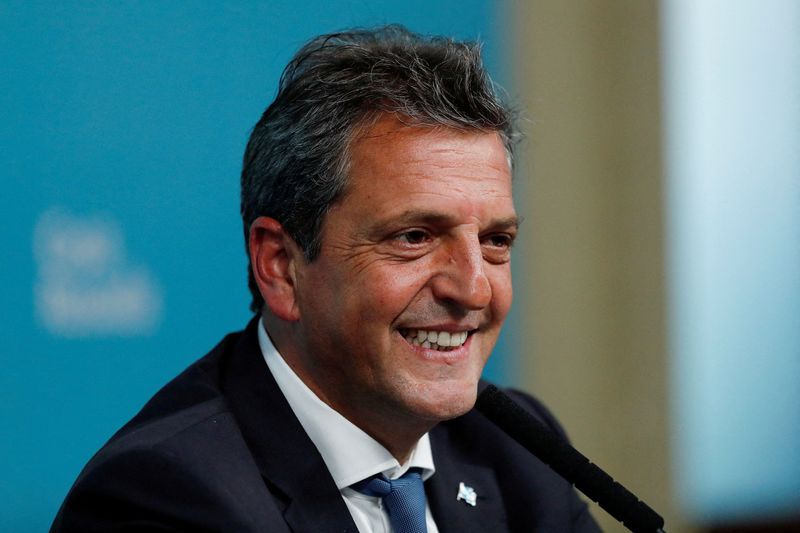By Walter Bianchi
BUENOS AIRES (Reuters) -Argentina's election line-up twist, which saw the ruling Peronist coalition torpedo a leftist candidate in favor of a centrist economy minister, boosted local markets on Monday, though analysts said it added a new spice to talks with the IMF.
The Peronist bloc, Union por la Patria, said on Friday economy minister Sergio Massa would be the sole nomination for the ruling coalition, spiking the day-old candidacy of a close ally to populist Vice President Cristina Fernandez de Kirchner.
With other frontrunners from the conservative opposition and the far-right, the decision means Argentina's next president, to be chosen in an October election, is likely to be more market-friendly, a salve for hard-hit investors in the indebted nation.
"The local market may view it favorably that the electoral scene now has presidential candidates who are moderate, pro-market and who know investors," said Javier Timerman of Adcap Grupo Financiero, cautioning that many still had their doubts.
On Monday sovereign bonds rose on average some 4% on the news, while the S&P Merval index jumped in early trade.
Argentina's sovereign bonds remain in distressed territory around 30-35 cents on the dollar after years of local and foreign debt restructurings and a new $44 billion deal with the International Monetary Fund (IMF) to replace a failed program.
The peso, leashed by currency controls, is depreciating steadily with a flourishing black market for dollars at a much higher price. Many investors have turned to equities, seen as a relative safe haven, boosting the stock market.
Fundcorp economist Roberto Geretto said Massa's candidacy makes "a break with the IMF or radicalization of economic policy in the short term less likely", and signaled a "loss of power" for the populist wing of VP Fernandez de Kirchner.
Other analysts, however, said it could add an extra political dimension to ongoing talks between Argentina and the IMF to speed out disbursements from the lender and ease economic targets linked to the deal. Massa has been leading those talks with the country hoping to strike an agreement this week.
"It's better to negotiate with a minister than a candidate," said Héctor Torres, former Argentine IMF representative.
"It is more predictable that the minister is ready to fulfill the commitments than a candidate, whose intention is to win the elections and puts that above all else."

Others said it would be a tricky balancing act for Massa as economy minister and candidate, as he battles inflation at 114%, tumbling foreign currency reserves and pressure to spend with poverty levels around 40%.
"It is crazy to have a minister of economy who is also a candidate for president," said Lorenzo Sigaut Gravina from consultancy Equilibra. "He must control public spending but at the same time has incentives to spend more for his campaign."